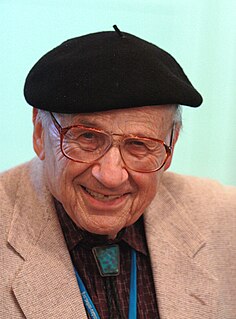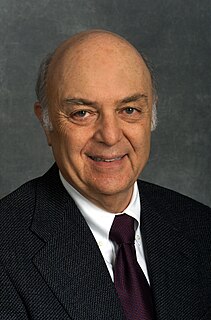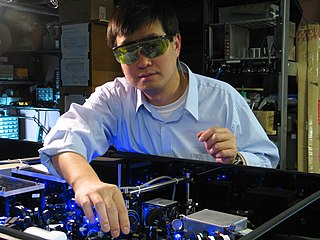Related Research Articles
The American Physical Society (APS) is a not-for-profit membership organization of professionals in physics and related disciplines, comprising nearly fifty divisions, sections, and other units. Its mission is the advancement and diffusion of knowledge of physics. The society publishes more than a dozen scientific journals, including the prestigious Physical Review and Physical Review Letters, and organizes more than twenty science meetings each year. APS is a member society of the American Institute of Physics. Since January 2020 the organization is led by chief executive officer Jonathan Bagger.

Walter Kohn was an Austrian-American theoretical physicist and theoretical chemist. He was awarded, with John Pople, the Nobel Prize in Chemistry in 1998. The award recognized their contributions to the understandings of the electronic properties of materials. In particular, Kohn played the leading role in the development of density functional theory, which made it possible to calculate quantum mechanical electronic structure by equations involving the electronic density. This computational simplification led to more accurate calculations on complex systems as well as many new insights, and it has become an essential tool for materials science, condensed-phase physics, and the chemical physics of atoms and molecules.

Bertrand I. Halperin is an American physicist, former holder of the Hollis Chair of Mathematicks and Natural Philosophy at the physics department of Harvard University.

Leo Philip Kadanoff was an American physicist. He was a professor of physics at the University of Chicago and a former President of the American Physical Society (APS). He contributed to the fields of statistical physics, chaos theory, and theoretical condensed matter physics.

Helen Rhoda Arnold Quinn is an Australian-born particle physicist and educator who has made major contributions to both fields. Her contributions to theoretical physics include the Peccei–Quinn theory which implies a corresponding symmetry of nature and contributions to the search for a unified theory for the three types of particle interactions. As Chair of the Board on Science Education of the National Academy of Sciences, Quinn led the effort that produced A Framework for K-12 Science Education: Practices, Crosscutting Concepts, and Core Ideas—the basis for the Next Generation Science Standards adopted by many states. Her honours include the Dirac Medal of the International Center for Theoretical Physics, the Oskar Klein Medal from the Royal Swedish Academy of Sciences, appointment as an Honorary Officer of the Order of Australia, the J. J. Sakurai Prize for Theoretical Particle Physics from the American Physical Society, the Karl Taylor Compton Medal for Leadership in Physics from the American Institute of Physics, and the 2018 Benjamin Franklin Medal in Physics from the Franklin Institute.

Marvin Lou Cohen is an American theoretical physicist. He is a University Professor of Physics at the University of California, Berkeley. Cohen is a leading expert in the field of Condensed Matter Physics. He is highly cited and most widely known for his seminal work on the electronic structure of solids.

Myriam Paula Sarachik was a Belgian-born American experimental physicist. From 1996, she was a distinguished professor of physics at the City College of New York.

David R. Nelson is an American physicist, and Arthur K. Solomon Professor of Biophysics, at Harvard University.
Ian Keith Affleck is a Canadian physicist specializing in condensed matter physics. He is Killam University Professor, Department of Physics and Astronomy, University of British Columbia.
Marc Kamionkowski is an American theoretical physicist and currently the William R. Kenan, Jr. Professor of Physics and Astronomy at Johns Hopkins University. His research interests include particle physics, dark matter, inflation, the cosmic microwave background and gravitational waves.

Laura H. Greene is a physics professor at Florida State University and Chief Scientist at the National High Magnetic Field Laboratory. She was previously a professor of physics at the University of Illinois at Urbana-Champaign [1].

Jun Ye is a Chinese-American physicist at JILA, National Institute of Standards and Technology, and the University of Colorado Boulder, working primarily in the field of atomic, molecular and optical physics.
Anna Christina Balazs is an American materials scientist and engineer. She currently is Distinguished Professor at the University of Pittsburgh and holds the John A. Swanson Chair at the Swanson School of Engineering.
Eugene John "Gene" Mele is a professor of physics at the University of Pennsylvania, where he researches quantum electric phenomena in condensed matter.

Maria Cristina Marchetti is an Italian-born, American theoretical physicist specializing in statistical physics and condensed matter physics. In 2019, she received the Leo P. Kadanoff Prize of the American Physical Society. She held the William R. Kenan, Jr. Distinguished Professorship of Physics at Syracuse University, where she was the director of the Soft and Living Matter program, and chaired the department 2007-2010. She is currently Professor of Physics at the University of California, Santa Barbara.
Karin M. Rabe is an American condensed matter physicist known for her studies of ferroelectric materials, multiferroics, and martensites. She is a distinguished professor and Board of Governors Professor of physics at Rutgers University.
Paula R. L. Heron is a Canadian-American physics educator who works as a professor of physics at the University of Washington.
Catherine Kallin is a Canadian theoretical quantum condensed matter physicist whose research topics have included spin wave theory, the quantum Hall effect, frustrated antiferromagnets, chirality in superconductors, and high-temperature superconductivity. She is a professor emerita of physics and astronomy at McMaster University.

Bei Zeng is a Chinese Canadian quantum information theorist at the Hong Kong University of Science and Technology, where she is a professor of physics, and director of the IAS Center for Quantum Technologies. As well as quantum information, her research interests include quantum computing and quantum error correction.
Sarah C. Eno is an American experimental particle physicist at the University of Maryland, College Park, where she is a professor of physics and UMD Distinguished Scholar–Teacher. She has participated in several large experimental collaborations in high-energy physics, including the AMY experiment at the Japanese TRISTAN particle accelerator, the DØ experiment at Fermilab in the US, the Collider Detector at Fermilab, and the Compact Muon Solenoid experiment at the Large Hadron Collider in France and Switzerland.
References
- ↑ "John R. Dutcher". University of Guelph. Retrieved 29 January 2022.
- ↑ "Dutcher Lab". University of Guelph. Retrieved 29 January 2022.
- ↑ "John R. Dutcher, Professor, Department of Physics". University of Guelph. Retrieved 29 January 2022.
- ↑ "APS fellow archive". American Physical Society.
- ↑ "APS Council Announces 2007 APS Fellows" (PDF). American Physical Society. March 2008. Retrieved 29 January 2022.